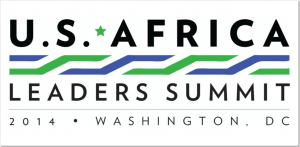Updated
US Africa Summit: A Logistical AND Diplomatic Success
Caitlin Dearing Scott, MAC
August 21, 2014
After all the media hubbub in advance of the US-Africa Leaders Summit – and very real complaints about how it was being handled by everyone from African civil society leaders to DC commuters – it looks like President Obama has since been vindicated.
Whether it was Johnnie Carson, former US Assistant Secretary of State for Africa Affairs, praising the Summit for reaffirming the US’ “commitment to the continent” and its work toward building a “stronger, broader and more comprehensive partnership with Africa;” Africa experts like Dr. J. Peter Pham of the Atlantic Council noting its “positive outcomes;” Mwangi S. Kimenyi of Brookings underscoring the “tangible plan of action and commitments” resulting from the Summit; or the array of African Leaders themselves who led successful delegations, most people agree that the Summit achieved its objectives of strengthening ties between the US and Africa, advancing the Administration’s focus on trade and investment in Africa, and highlighting America’s commitment to Africa’s security, its democratic development, and its people.
Of course, successfully pulling off the myriad logistical requirements of such a Summit is one thing. Building concrete partnerships and achieving true gains in the areas of security and development is another. Thanks to the wide range of activities outside of the official Summit, some of that is already being done. Many members of the Moroccan delegation, for example, took advantage of their stay in Washington to foster stronger public and private sector ties. In addition to participating in more than 70 meetings and events, members of the Moroccan delegation signed a number of agreements designed to bolster security cooperation and promote development. Among them:
- The United States and Morocco signed a Framework for Cooperation on Training for Civilian Security Services “to strengthen regional counterterrorism capabilities and to deny space to terrorists and terrorist networks.”
- Mohamed El Kettani, Chairman and CEO of Morocco’s Attijariwafa Bank, signed a memorandum of understanding with the Overseas Private Investment Corporation (OPIC) and Wells Fargo bank to expand lending to small and medium enterprises in Morocco.
- Executive Director of the National Office of Hydrocarbons and Mines (ONHYM) Amina Benkhadra signed a memorandum of understanding with Kosmos Energy and Chevron to provide training to engineering students at Morocco’s Ecole Mohammadia and National School of Mineral Industry.
- The American Society of Travel Agents held a signing ceremony on August 6 with Abderrafih Zouitene, CEO of the Moroccan National Tourist Office, to officially announce Marrakesh as ASTA’s next Destination Expo 2015.
 And, of course, at the US-Africa Business Summit, President Obama also announced that this year’s Global Entrepreneurship Summit will be held in Morocco.
And, of course, at the US-Africa Business Summit, President Obama also announced that this year’s Global Entrepreneurship Summit will be held in Morocco.
This kind of official and private sector engagement is exactly what is needed to put the commitments of the US-Africa Summit into action. In addition to continuing to forge stronger bilateral ties with African countries, the United States can, and should, work to strengthen multilateral ties through the help of African allies, like Morocco, who have already demonstrated their commitment to the stability and growth of the entire continent.
.
